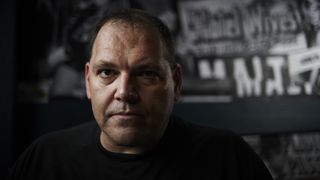Bill Stevenson is the brains behind Descendents; the legendary Californian punk rock group in which he also plays drums, writes songs and oversees production duties. Since the band formed in 1977, he’s remained the only constant member.
In addition to his role as captain of the Descendents, he also steers the ship in All; a band he started with his old Descendents bandmates Karl Alvarez and Stephen Egerton after singer Milo Aukerman left to pursue a degree in biochemistry. And from 1981-1985 he also played drums in Black Flag.
On top of all that, he’s one of the most in-demand producers in punk – he’s worked with NOFX, Rise Against, Alkaline Trio, The Bouncing Souls, Hot Water Music, Propagandhi and Good Riddance – as well as something of a hero to anyone who loves the genre. And this is what’s on his mind…
“Punk rock gave me a place to be and a way to belong. Before punk rock I really wasn’t very social; I didn’t have tons of friends and I never felt like I fitted in anywhere. There were only about four or five punk rock kids at my school, but when I met them I felt like I’d finally found my own place where I was accepted. It was the same at the shows; you didn’t need to be cool to go there and have fun. And the music was so new and exciting. I’d never heard anything like it before. By some stroke of good luck I found my way into this new magical world of music.”
“We were all so young when Descendents started. We weren’t old or wise enough to have a plan or a strategy; we were just little kids trying to learn how to play. The goal of the band was just to play better and write better songs. We were obviously influenced by bands that we heard, and the bands that influenced us the most were The Last, The Alley Cats, and also Black Flag. They’d be the top three, but then there was so many more behind that; The Germs, The Weirdos, X, the Ramones and so on.”
- This Is Hardcore: Descendents – Milo Goes To College
- The 10 best Descendents songs, ranked in order
- What happened when thousands of punks descended upon a British seaside town?
- Descendents and the story of Milo, punk's most nerdy mascot
“All the members of Descendents and Black Flag lived within a two-mile radius of each other. We used to share practice rooms – maybe it would be Black Flag and Descendents, or Red Kross and the Minutemen – and we’d put carpets up on the walls to deaden the sound so the cops wouldn’t come. We were all in it together. Eventually, Black Flag’s drummer Robo got deported back to Columbia after his visa expired, and that initiated me working with the band. They had a few different drummers filling in for him for very short periods of time but it always seemed to circle back to me, and at a certain point I thought it might be best for everybody involved if I just joined Black Flag, which I did.”
“I joined Black Flag at a very interesting time. The music was really evolving and moving in a lot of different directions; part of it was moving in a much slower, more dirgey direction, and another part of it was moving in this more progressive direction. Being the youngest person in the band, I was really just there to help them implement what their ideas were. I was never a main songwriter in Black Flag the way that I am in Descendents.”

“Descendents have always written music and lyrics that are important and pertinent to us at whatever age we happen to be. Right now, that age is 52. So we’ve evolved in that way musically. Functionally, because all of us have families now – whether or not that involves actually having children – we don’t tour so incessantly as those periods when we were younger. Back then, it wasn’t uncommon for us to get in the van and go for periods of two or three months at a time. We don’t do it that way anymore; now we go out and play a few shows, and then we go home.”
“Producing records is fun if you’re working with a good band. If the band isn’t as good then it’s not as fun. But it’s still fun. My strategy, to speak to it broadly, is just to help out the band in whatever way they need help. Some bands just need a good recording of their songs; they’ve already arranged the songs and they can perform them really well, so I just need to get them a good recording and a good mix. Other bands will show up at the studio with songs that aren’t completely finished, or perhaps they’re not arranged in a way that makes sense to me, or maybe they’re not the best players, and so I help them in those areas.”
“Fame is hard to quantify because it really isn’t something you have any control over. It sort of just happens or it doesn’t, and since it’s kind of a fluke phenomenon I don’t put much weight or stock in it as something by which I judge my worth as a human. If you’re the best plumber in the world you don’t get famous or have people falling over themselves to get your autograph. So why do people like to have their pictures taken with musicians? It’s a little weird. Fortunately, I’m not famous in the way where that becomes a functional problem when I’m just trying to get from point A to point B out there in the world.”
“I value my friendships a lot. I’m sure everyone values their friendships a lot, but I guess what I mean is that I don’t have a million friends; I have a few friends that I’ve had for many, many years. You get a lot of trust and reliability in an old friendship that’s survived decades, and I confide in my friends when I have problems. So friendship is important to me on that level. But as far as being a social person who’s out there being everyone’s friend, I don’t value that so much.”
“Love makes the world go round. I believe in very simple philosophies when it comes to love: bread for one is bread enough for two, love thy neighbour as thyself, and treat people in a way that you would like be treated. I believe we should practice tolerance in regards to the love of various other human beings on the planet, too. It’s hard in this life to find love at all; if two people are lucky enough to find it, regardless of what age, racial or sexual orientation they are, they shouldn’t have anyone tell them it’s not valid.”
Descendents new album Hypercaffium Spazzinate is out now on Epitaph.


